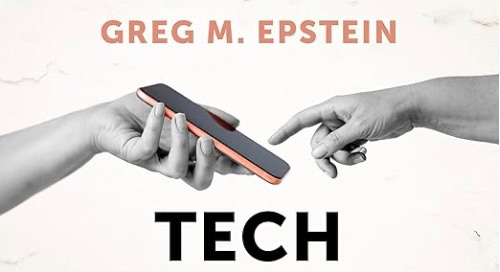We live in deeds, not years; in thoughts, not breaths; In feelings, not in figures on a dial. We should count time by heart-throbs. He most lives Who thinks most, feels the noblest, acts the best.
Nearly two centuries after Philip James Bailey penned these lines in Festus, his warning about confusing measurement with meaning has become startlingly relevant. As our lives become increasingly quantified—through likes, views, steps, and scores—Greg Epstein's Tech Agnostic asks us to consider what we might be losing in our rush to reduce human experience to data points. It is a timely reminder that amid our digital devotions, the measure of a life remains profoundly human.
In an era where technology has become our most pervasive influence—surpassing even religion in its grip on twenty-first-century life—Epstein's work delivers an urgently needed exploration of this modern faith. Drawing from his experience as Harvard and MIT's humanist chaplain and his bestselling work Good Without God, Epstein argues for a freethinking approach to our relationship with technology. Instead of worship, he proposes tech agnosticism as a way of life—a mindset rooted in skepticism and critical thinking that allows us to embrace innovation without losing sight of our shared humanity.
Ultimately, Tech Agnostic is a book that's not just about technology or religion, but about what it means to be human in a world that's increasingly complex, interconnected, and uncertain. It's a call to action, urging us to reclaim our sense of humanity and connection to the world around us, and to demand that innovation serves the greater good.
Epstein doesn’t romanticize a mythical pre-tech past, nor does he call for outright rejection of progress. Instead, he asks the questions we too often overlook in our enthusiasm for the next big thing: who truly profits from uncritical faith in technology? How can we repair its harm while retaining its benefits? Through this lens, he revisits the skeptics, whistleblowers, and reformers of history, presenting a tech reformation we desperately need.
What makes this book stand out is Epstein’s ability to illuminate the parallels between the tech industry and traditional religious structures. Today’s tech leaders are presented as modern-day mystics, their devices and platforms as tools of transcendence, and our constant connection as a form of digital communion. Yet, Epstein challenges us to remain critically detached, resisting the seductive allure of “all that glitters” in favor of a deeper, more meaningful life.
Particularly compelling is Epstein’s exploration of technology as both a magnifier and disruptor of our humanity. He dives into how it amplifies our awareness, creating a state of perpetual witnessing that we can neither unsee nor escape—a phenomenon that feels all too familiar in an age of nonstop notifications and curated feeds. He reminds us that it’s not enough to passively consume innovation; we must demand it serve the greater good, fostering lives worth living.
The book is not only a critique but a call to action—a thoughtful roadmap for navigating our tumultuous times, where religious extremism, unchecked capitalism, and technological obsession often collide. By proposing tech agnosticism, Epstein encourages us to hold space for skepticism until innovation proves itself truly worthy of our faith.
Tech Agnostic is more than just a book about technology or religion; it’s a profound meditation on what it means to stay human in an age when the sacred and the digital are increasingly intertwined.
tp



